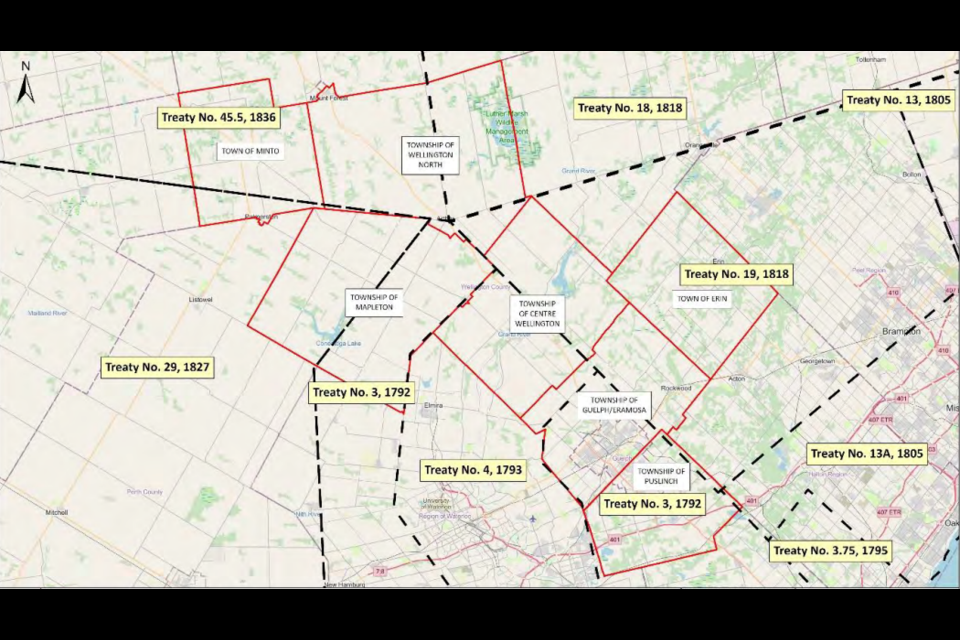WELLINGTON NORTH ‒ The Municipality of Wellington North has its first land acknowledgment, described as a starting point at improving relationships with Indigenous Peoples.
To be included at the beginning of “key” township meetings and business, Martin Cooper, senior archaeologist for consulting firm Archaeological Services Inc. (ASI), and the Indigenous engagement lead on the project, presented the finalized land acknowledgment during a regular council meeting Monday evening.
“While only one part of the larger conversation and needed action around truth and reconciliation, land acknowledgments are an important starting point,” said Cooper, in the report. “They not only acknowledge the presence of Indigenous peoples past and present, but they help educate the community on the traditional lands and treaties that existed as well as the instances when Indigenous peoples were displaced and excluded from those traditional territories."
According to the report, land acknowledgments originating from settler-colonial institutions and governments were invented in the last decade “as a small yet significant way to show respect” while acknowledging the presence of Indigenous peoples past and present, their traditional lands, treaties, and the exclusion they’ve faced.
“Land acknowledgments are an opportunity for the larger society to state the wrongs of the past and contribute to a feeling of inclusivity, not be a source of further alienation,” said Cooper. “(This) should not be the culmination of a municipalities attempt at reconciliation, but a starting point.”
During the land acknowledgment development process, representatives of the Six Nations of the Grand River, the Mississauga of the Credit First Nation, and the Saugeen Ojibway Nation provided written comments on the report.
Some points that ASI considered were recognizing past injustices, avoiding redundancies, and speaking to the past, present, and future of Indigenous people in the county.
“Generally, a land acknowledgment should not be static, but fluid and open to revision,” said Cooper. “Once adopted, one should seek opportunities to improve the relationship between non-Indigenous and Indigenous members of the community.”
Land acknowledgments have also been the subject of criticism from both Indigenous and non-Indigenous commentators across Canada. Some critics have pointed out that “poorly conceived” land acknowledgments can have the “opposite effect of what they are intended to do.”
“Some Indigenous people feel that (land acknowledgments are) just paying lip service to reconciliation,” said Cooper. “They're just worried that it's also to relieve guilt for what happened in the past.”
Ten Nations were contacted about the project across Wellington County.
According to the report, the Township of Wellington North falls within the lands covered by the Nanfan Treaty, Treaty 3, the Nottawasaga Purchase/Treaty 18, the Ajetance Purchase/Treaty 19, and the Saugeen Tract Purchase/Treaty 45.5.
“Another major problem with (land acknowledgments) is that sometimes they're not well thought out, and they're not historically accurate,” said Cooper. “They'll mention groups that were never in the area or groups that were never in Ontario for that matter…and so there’s been a lot of criticisms and talk about how to try to overcome those things.”
During the meeting, Coun. Lisa Hern said she “really appreciated” the report.
“I do think that this (land acknowledgment) is so extremely important,” said Hern. “Because we have to remember where we came from to envision wherever we’re going.”
In terms of the next steps, Cooper says that it’s in the municipality’s hands, the Nations are “just waiting for the phone call.”
“Reach out and ask to meet with them and develop a relationship; that's the whole idea, the land acknowledgement (shouldn’t) just be a land acknowledgement,” said Cooper. “If someone reaches out to a Nation and asks them to engage, they’ll appreciate it, they’ll know what you’re saying is sincere.”
Wellington North’s official land acknowledgment reads:
“The lands that we know today as the Township of Wellington North have been home to Indigenous peoples since time immemorial. We acknowledge that we are on the treaty lands and traditional territory of the Anishinaabe and Haudenosaunee. With increasing encroachment by non-Indigenous settlers in the Township of Wellington North, the Anishinaabe and the Haudenosaunee could not continue their traditional lifestyle and settled in their villages on the Credit River, Lake Huron, Lake Simcoe, and in the Grand River Valley.
"These nations uphold their Treaty Rights within our jurisdiction. Today, the Township of Wellington North remains home to Indigenous peoples from across Turtle Island. We are grateful to have the opportunity to share and respect Mother Earth and are committed to building constructive and cooperative relationships with Indigenous nations.”
Isabel Buckmaster is the Local Journalism Initiative reporter for GuelphToday. LJI is a federally-funded program.
